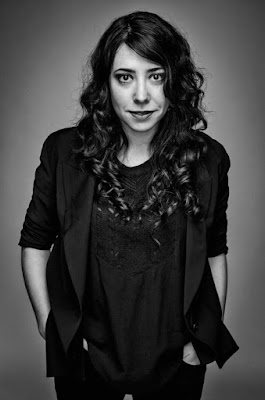Extreme Vulnerability: An Interview with Small Mouth Sounds Director Rachel Chavkin
By Simon Hodgson
What was your process in terms of staging Small Mouth Sounds?
Once we had a cast, it became about doing it again and again and again. There’s this one moment in the entrance sequence that we call the “shoe carousel,” where all of the characters realize one by one that they are supposed to have taken off their shoes. And we would just run it and run it again. On what seemed like the thirtieth time, Brad [Heberlee, the actor playing Ned in the New York premiere] couldn’t get his shoes off and it was like this tremendous, beautiful shit-show ballet. Brad got caught by the shoe rack and the whole time Babak [Tafti] just keeps breathing. Meanwhile I’m peeing myself, because the actors are so in character and they’re all so fucked up and flawed and it’s just very, very funny. And this is the way we staged the whole show. It was made with such gentle improvisation because there was no other way to make it. There’s no language to alter; it’s just the way an actor opens an envelope. In that sense, this play is really an actor’s dream.
How is this play going to be different in San Francisco?
This play raises a deep question about the pursuit of happiness and whether we should be happy. Is it possible for us to be mindful and happy in a world with so much suffering? Those questions are really at the heart of California, which is such a pioneer in not only mindfulness but also libertarianism. In California—happily, hopefully—we won’t have to work quite as hard to make people understand why you would do a silent retreat in the first place. I’m truly aware that San Francisco is a place where silent retreats are alive and well and unquestioned.
Why do you think this play resonates so deeply?
It’s the humor. This work is so beautiful, but it’s also rooted in the absolute pain and mortification of being human. Each of the characters is living inside that while being sort of a fool. There’s something about the horror show of the moment that we’re in, mingled with the extreme vulnerability of living our very short and very tiny lives.
Small Mouth Sounds runs until December 10 at A.C.T.’s Strand Theater. Click here to purchase tickets through our website. To read more of our interview with Rachel Chavkin, order a copy of Words on Plays, A.C.T.'s in-depth performance guide series.
Rachel Chavkin is accustomed to theatrical challenges. The Tony Award–nominated director of Natasha, Pierre & the Great Comet of 1812 is steadily building a theater career encompassing productions that employ music, video, dance, and other multimedia. “I’m drawn to anything that asks me to make something that I’ve never lived in before,” says Chavkin, “that requires me to learn how to do something or create a different culture. That’s not only how I think about design, but it’s also how I think about performance style, the world of the play, or the culture that I’m forging onstage.” We sat down with Chavkin to discuss the humor and heartbreak of Small Mouth Sounds.
 |
| Small Mouth Sounds director Rachel Chavkin. Photo by Chad Batka. |
Once we had a cast, it became about doing it again and again and again. There’s this one moment in the entrance sequence that we call the “shoe carousel,” where all of the characters realize one by one that they are supposed to have taken off their shoes. And we would just run it and run it again. On what seemed like the thirtieth time, Brad [Heberlee, the actor playing Ned in the New York premiere] couldn’t get his shoes off and it was like this tremendous, beautiful shit-show ballet. Brad got caught by the shoe rack and the whole time Babak [Tafti] just keeps breathing. Meanwhile I’m peeing myself, because the actors are so in character and they’re all so fucked up and flawed and it’s just very, very funny. And this is the way we staged the whole show. It was made with such gentle improvisation because there was no other way to make it. There’s no language to alter; it’s just the way an actor opens an envelope. In that sense, this play is really an actor’s dream.
How is this play going to be different in San Francisco?
This play raises a deep question about the pursuit of happiness and whether we should be happy. Is it possible for us to be mindful and happy in a world with so much suffering? Those questions are really at the heart of California, which is such a pioneer in not only mindfulness but also libertarianism. In California—happily, hopefully—we won’t have to work quite as hard to make people understand why you would do a silent retreat in the first place. I’m truly aware that San Francisco is a place where silent retreats are alive and well and unquestioned.
Why do you think this play resonates so deeply?
It’s the humor. This work is so beautiful, but it’s also rooted in the absolute pain and mortification of being human. Each of the characters is living inside that while being sort of a fool. There’s something about the horror show of the moment that we’re in, mingled with the extreme vulnerability of living our very short and very tiny lives.
Small Mouth Sounds runs until December 10 at A.C.T.’s Strand Theater. Click here to purchase tickets through our website. To read more of our interview with Rachel Chavkin, order a copy of Words on Plays, A.C.T.'s in-depth performance guide series.

